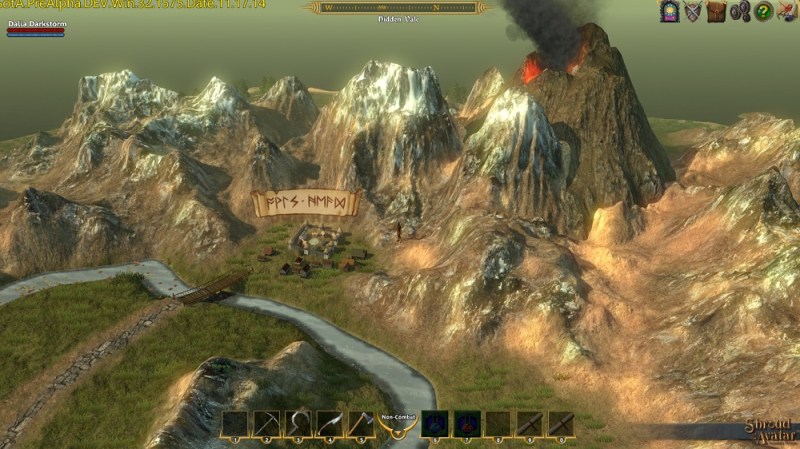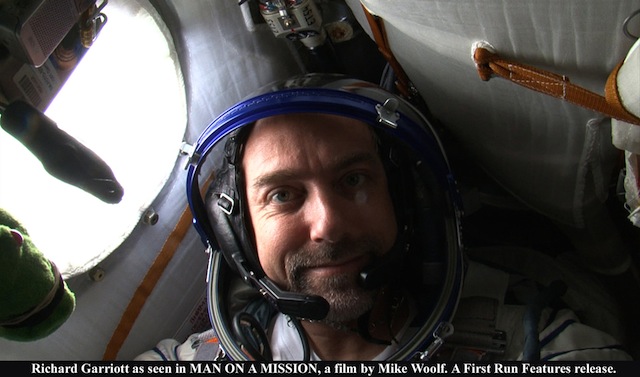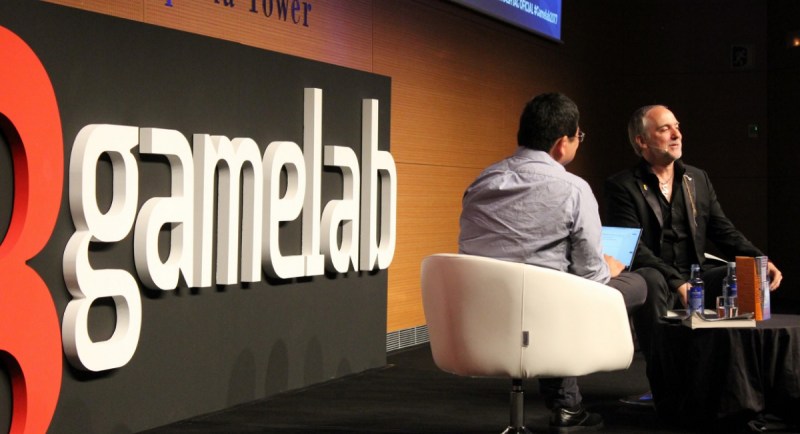
Above: Richard Gariott floating inside the International Space Station.
With Tabula Rasa, it was a similar issue, but instead of being at the end, it was at the beginning. We were going to create a game that would hopefully sell well in both Korea and the U.S. For two years, we kept shipping game designs and art styles to Korea, and for two years, we got feedback saying, “No, this isn’t right for Korea.” Here we are burning time and lots of money not really starting at all because we could never understand what they wanted from us or provide them something they were happy with.
In the end, we just said, “We can’t make a game for you. We’ll make the game we think we should make for the audience we know….” But those two years of false starts set the project behind in time and in budget at level where the pressure to ship began, frankly, before we even got started. It was a very difficult game to finish — again, because of that unclean start to the vision.
In the end, for both Ultima VIII and Tabula Rasa, I’m actually very happy with those games, once they were polished and patched and rectified. But by then, it’s too late for the marketing window. I’m not entirely sure what the lessons to pass on from that are. But having a good, clean, strong vision from the start, and standing by it until you finish, I think is crucial. I always found that if you allow yourself to wander or you allow your publisher to make you wander, it’s a recipe for disaster.
GamesBeat: This did lead you to becoming independent again, in the Kickstarter era. Tell us about what that transition has been like.
June 5th: The AI Audit in NYC
Join us next week in NYC to engage with top executive leaders, delving into strategies for auditing AI models to ensure fairness, optimal performance, and ethical compliance across diverse organizations. Secure your attendance for this exclusive invite-only event.
Garriott: One of my takeaways from now having completed two cycles of going independent and then being part of a company — I’ve already told you that the pressure to go from small to big is because of competition for distribution. Once you are big, you have the opposite problem, which goes back to one of the reasons I think a lot of big companies are slow to turn. They are by their nature risk averse. They acquire new properties. They acquire new gameplay. But they’re not good at inventing new properties or new gameplay.
If they’re going to put $100 million or more into a product, it needs to succeed. Their stock will suffer dramatically if they fail at one of these giant sequels they’re doing. They’re very risk averse. They need to have some level of predictability and reliability in their release schedule. It shouldn’t be surprising to us that if you end up working with a big company, you’ll work with big properties that you’re evolving but not taking giant risks.
If you want to go do something new, which I think a lot of us do — that’s where I get a lot of my enjoyment — you need to go back off on your own and start small. The cycle of small to large is understandable, and it’s something I embrace now. In this case we said, “We want to go off and create the spiritual successor to the Ultima series.” But we wanted to change it up significantly. We wanted to change the technological basis to this thing we call selective multiplayer.
Above: Shroud of the Avatar: Forsaken Virtues.
GamesBeat: This is in Shroud of the Avatar, right?
Garriott: In Shroud of the Avatar in particular. We knew we would be taking risks with the model that large publishers would have a difficult time embracing. But games now are not something you can do small by yourself. You need more cash in your pocket to even make a modest game than was the case 20 years ago. That’s when we became an early participant in crowdfunding. Shroud of the Avatar is actually the number two crowdfunded game in history. It’s a distant number two behind Star Citizen, which is 10 times bigger than we are.
Now, we’re at a point where we’re going to be launching later this year, so we’re looking to grow and become a publisher for the first time. We’ve been purely a developer until now. We’re doing another type of crowdfunding that didn’t exist when we started, equity crowdfunding, with a company called Seed Invest. People can directly invest in the company as we grow to become a publisher. We think this will be a great model for this size and this time. But for us to really succeed as a company, we’re not only going to grow as a publisher for Shroud of the Avatar, but we’re going to grow to publish other products from creators of worlds. I anticipate, in five years or so, that we may feel the pinch to partner up with a much larger company.

Above: Shroud of the Avatar: Forsaken Virtues.
GamesBeat: What’s your view of the future, looking at things like VR and beyond?
Garriott: I mentioned at the beginning that my power of prediction was very bad when it came to Apple versus PC. By no means do I believe that I can — I became very platform agnostic. Whatever platform people decide to play on, we need to provide them with entertainment on that platform. But I’ve also noted that there are opportunities. You can build new companies and new IP as new platforms emerge.
Talking about VR, I’m a huge fan. I owned VR hardware back in the Apple II days. There was a really terrible set of goggles back then with these postage-stamp monitors in front of your eyes, terrible lag time, very low resolution graphics. It was cool, but obviously, nowhere near ready. We thought, “Give this five or 10 years, and it’ll be great.” That was 40 years ago. Every five or 10 years, new hardware comes out, and I think, “Wow, this is close, but give it another five or 10 years.”
My personal opinion of the current state of VR is that unfortunately, we’re still not quite there yet. It makes great demos. I have a lot of the hardware at home. My kids love to look around in it briefly. But I don’t yet see the economics to back it up. I don’t think we can move through the world fluidly enough. We still have this problem of having to suit up and take it off. You lack the freedom to move around a space when you’re tethered. Peripheral view is still a problem. Seeing your hands is still a problem. Feeling like I have clubs for hands interacting with the world is still a problem.
All these things are solvable. People are working on it, and there are some really cool things to do in VR. It’s all really cool. But what I don’t see is anything even remotely close to the economics of purchases happening that’s necessary to justify the billions of dollars that are being put into hardware. I’m fearful not only that we’re going to see a short-term crash, but at least personally, I don’t see a path out at the other end yet.
That doesn’t mean that, on any given day, someone here in this building could have the solution that fixes it all, and suddenly, VR reaches its stride as the economic powerhouse of the future. I presume that someday that will happen. I hope to be a part of it and catch it soon enough to do my own IP development at that time. I just think that a lot of the hype is dramatically in front of the practical realities of making money.

Above: Richard Garriott, aka Lord British, on board the International Space Station.
GamesBeat: Like your father, you suited up and went into space. Maybe suiting up in VR is going to be the next big thing someday.
Garriott: There’s nothing I would enjoy more than creating and experiencing something as close to The Matrix as we can possibly build.
Question: You talked about the early days of the MMO market. What did you think about the revamping of Final Fantasy XIV, after the original version of the game was so unsuccessful?
Garriott: When you look at business models and platforms and even individual releases in a series of games — I can’t tell you how many times people have told me about the death of the future of any one of those categories. For example, pretty much my whole career, I’ve been told that PC games are dead. Every two years, PC games are dead, and you need to get out of developing for the PC. I’m still developing for the PC, and I’m quite content.
I can’t tell you how many times I’ve been told that medieval fantasy is dead. When Star Wars came out, people said it had to be science fiction or nothing. When The Matrix came out, it had to be modern people in trench coats and sunglasses or nothing. EA told me, back in the day, that nobody wanted to play as a man running around in tights. They wanted to look cool in a leather jacket. And then, similarly, if you have one hiccup in a game release, people assume that whole game product line is now washed up and dead.
When people are telling you that, and they’re powerful people, powerful partners, people in charge of your economic future, it’s hard not to pay attention and think hard about this advice they’re giving you because they’re giving it to you in a well-meant way. They’re just wrong. What I’ve learned, at least — as a game developer, it’s important not to just stay with your plan because it was your plan, because that’s the way you started. But if you really believe — if you listen to the feedback, and you’ve done your research, and you believe you have something compelling to do — the best thing you can do is stand your ground. That doesn’t mean don’t listen, but it means you should take the input, grind through it, reflect on what this means to you, and push on.
Final Fantasy, I think, is one of these great perennial properties that has a foundation of incredible strength. Sure, it’s perfectly fine to have a hiccup as you change features, as you experiment, as you try to move outside the confines of what you did before. It’s understandable that some efforts won’t be as strong. But that’s no reason to give up on the property. You bind up your wounds, circle back, and try again.

Above: Richard Garriott came up with the term “avatar” for game characters.
Question: What did you think about the arrival of mobile games?
Garriott: As a creator, I’m still PC first. As a player, I’m absolutely mobile first. In fact, there are probably 10 games I ever played to completion on PC, the games I truly love. But they’re all from more than five years ago. I now have about 10 games on mobile that I love and have played to completion multiple times, all of them on mobile. Most recently, it’s Monument Valley one and two. A game called Spider was the first one I loved on a touch screen. Plants vs. Zombies is a great favorite. There have been quite a few others.
Disclosure: The organizers of Gamelab paid my way to Barcelona. Our coverage remains objective.


